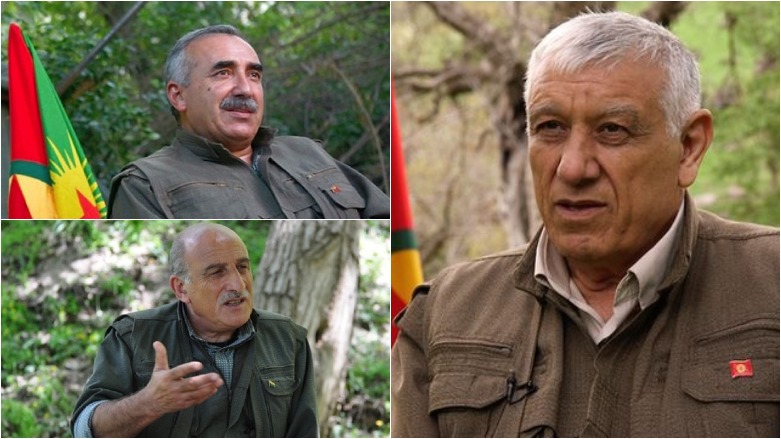US offers millions for information on PKK leaders

WASHINGTON DC (Kurdistan 24) The US announced on Tuesday that it is offering millions of dollars for “information that brings to justice” three senior leaders of the Kurdistan Workers’ Party (PKK.)
The announcement came as US Deputy Assistant Secretary of State for European and Eurasian, Matthew Palmer, completed a two-day visit to Ankara, in which he “met with a number of high-level Turkish government officials, business leaders, and members of Parliament,” according to a US embassy statement.
The money is being offered by the State Department’s “Rewards for Justice (RFJ) Program,” which was established in 1984 and provides “rewards for information that leads to the arrest or conviction” of anyone involved in international terrorism against US targets; “the identification or location of a key terrorist leader;” or the disruption of terrorism financing, the RFJ website explains.
In 1997, the US formally designated the PKK a terrorist organization. Since 2008, the US has also formally labelled it as a “significant foreign narcotics trafficker.”
Murat Karayilan, who has headed the People’s Defense Forces (HPG), the PKK’s military wing, since 2013, is the most senior of the three figures named on Tuesday. The US is offering $5 million for information about him.
In addition to charging Karayilan with involvement in terrorism, the US also designated him in 2009 as a “significant foreign narcotics trafficker.”
The RFJ Program is also offering $4 million for information about Cemil Bayik, a founding member of the PKK, who, in 2011, was also designated a foreign narcotics trafficker.
The third figure named on Tuesday is Duran Kalkan, a senior PKK figure, also designated in 2011 as a narcotics trafficker.
Kurdistan 24 asked the State Department why it had decided now to offer the multi-million dollar rewards, but received no response.
There is a readily obvious answer, however: it represents an attempt to placate Turkey, whose president, Recep Tayyip Erdogan, has recently increased his complaints about the US alliance with the People’s Protection Units (YPG) in Syria, where the YPG-led Syrian Democratic Forces (SDF) have been America’s principle partner in the fight against the Islamic State (IS.)
Ankara considers the YPG to be the Syrian branch of the PKK. Recently, it has gone so far as to engage in cross-border shelling, endangering the lives of Syrian civilians, as well as US forces, embedded with the SDF.
The US has responded to Turkey’s attacks with “assurance patrols,” in which US troops conduct patrols, alongside SDF forces.
As Col. Robert Manning, Director of Defense Press Operations, explained to reporters on Monday, “There is no set timetable for these specific patrols,” but they “will allow us, Turkey and our SDF partners to maintain the safety and security of the region.”
The US has made a very serious commitment to the security situation in Syria, east of the Euphrates. It views the region as stable and believes that stability there is necessary to prevent IS’ return.
The US also sees retaining control of that area as a way to block Iran’s efforts to build a “land-bridge” to the Mediterranean, as well as leverage for negotiations on the future of Syria, in accord with UN Security Council Resolution 2254, as Secretary of State Mike Pompeo recently explained, while he hailed Syria’s Kurds as “great partners” in the fight against IS.
Whether the YPG leadership really understands that is unclear. As a well-informed source observed to Kurdistan 24, the US commitment is shown not only by the statements of US officials, but also by “the huge US bases” in Rojava, as well as “the constant flow of military supplies.”
He noted that there is a growing gap between the YPG leadership and the Rojava population, because the leadership retains the left-wing ideology on which the PKK was founded in 1978—after which it soon began receiving support from the Soviet Union, Syria’s Baathist regime, and even revolutionary Iran (one US official told Kurdistan 24 that the PKK continues to enjoy Tehran’s backing.)
Ideological blinkers may inhibit the YPG leadership from fully recognizing the extent of the support that it is receiving from the US, as well as France, which has forces in Syrian Kurdistan, as well.
He also suggested that Kurds in Syria do not appreciate the proliferation of posters of Abdullah Ocalan, the PKK founder, who has languished in Turkish prison since 1999, after the Syrian regime came under strong international pressure to end Ocalan’s safe haven there.
In fact, they would be happy to see the posters go, as they even think that they might be provocative to Turkey, while they long for little more than an end to fighting and conflict.
Editing by Nadia Riva
